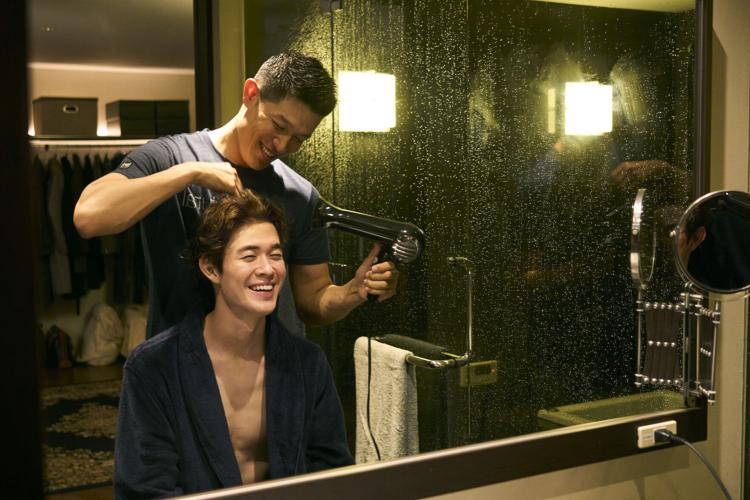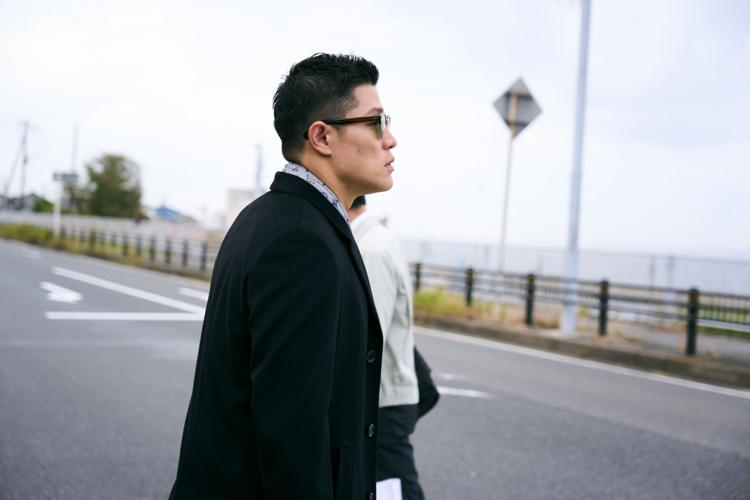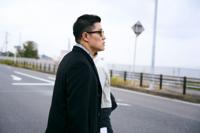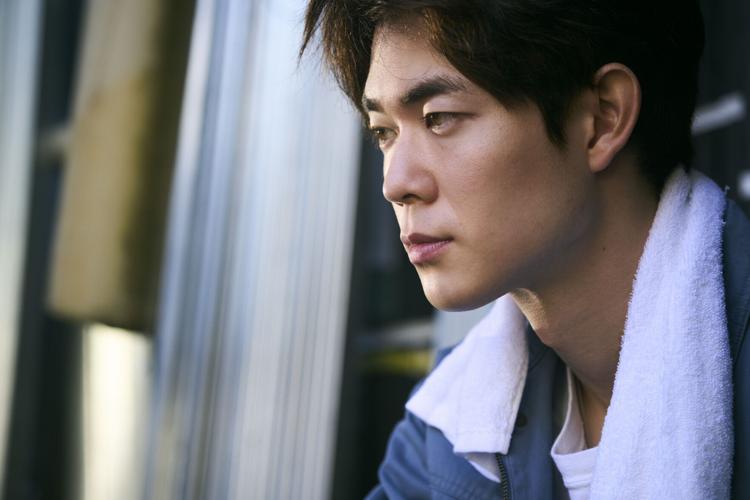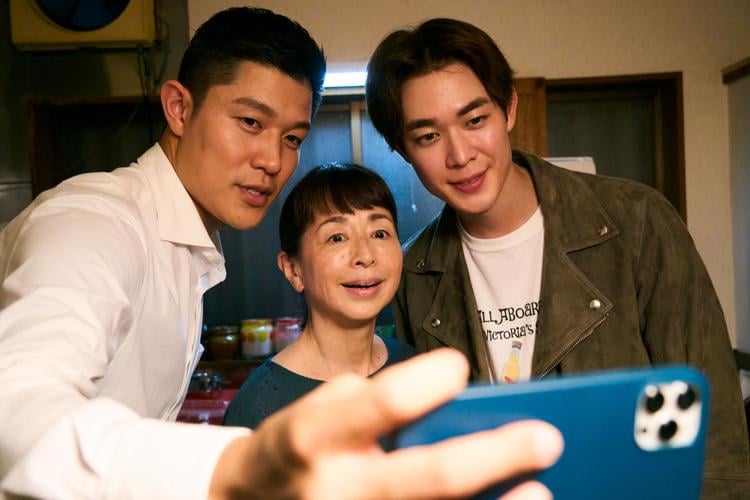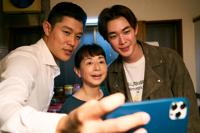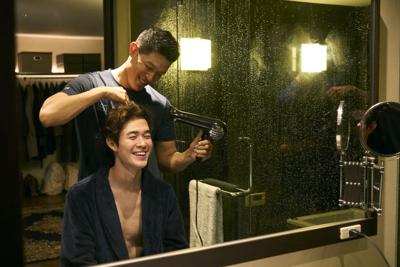If you do even a tertiary search, you won't find a lot of Japanese films about gay men who live their lives openly. There have been a splattering of independent queer films over the decades, but nothing that has been really mainstream. There hasn't been that much here in the United States either, but this country has had Brokeback Mountain (2005) or even highly successful TV shows like Will & Grace (1998). Again, a tertiary search doesn't really reveal any equivalent films or TV shows in Japan. The Land of the Rising Sun does have a rich culture of manga and anime that depicts "yaoi" or what's known as "boy's love," which are homoerotic tales, mostly in cartoon form. There have been a ton of live-action TV shows produced that are "yaoi," but a lot of it has been produced outside of Japan in countries like Thailand, South Korea and the Philippines. This film represents a step forward. It was released last year in Japan and given a very limited, theatrical run in the United States this year. From what I could gather, not many people saw it, even though it did get nominated for Japan's equivalent to the Oscars. Because June is Pride Month, it's a perfect film to spotlight, if you're looking for a great film, representing the gay community.
This film is based on a 2010 novel by Makoto Takayama and its story is very reminiscent of several gay narratives that I've seen going back over 20 years. Its premise is also reminiscent of a popular, straight, romantic comedy. However, this film takes some diversions that make it quite unique and very powerful. Yet, the film that came to mind the most was last year's most talked-about gay romance, All of Us Strangers (2023). That BAFTA-nominated feature from Andrew Haigh was about a gay man dealing with the loss of his parents and trying to reconcile with that fact. The introduction of a younger male lover helps him to realize his parental issues. Haigh was adapting a Japanese novel as well, but Haigh was working with supernatural elements. Here, director and co-writer Daishi Matsunaga is basically tackling all of those same themes from All of Us Strangers but minus the supernatural stuff. Matsunaga's film is therefore even more grounded and just as, if not more powerful and impactful.

Ryohei Suzuki stars as Kosuke Saito, an editor at a fashion magazine. When the film opens, he's overseeing a photo shoot. He probably oversees a lot of the pictures that goes into the magazine. He reminds me of the protagonist in Front Cover (2016) but older and perhaps not as active in looking for a boyfriend or partner. When Kosuke is not at work, he hangs out with his fellow gay male friends. They have what can be called a Japanese version of a kiki, except it's normally Kosuke and his friends at a restaurant table chatting about dating, marriage and fitness. One day, one of his friends recommends a personal trainer with whom Kosuke decides to meet a couple of times a week.
Hio Maiyazawa co-stars as Ryuta Nakamura, the personal trainer who is recommended to Kosuke. Ryuta is a younger guy, maybe in his early 20's or mid 20's, whereas Kosuke is likely in his 40's. He's a very positive, very upbeat and very sweet trainer who works well with Kosuke. Kosuke does notice that Ryuta is struggling financially, mainly because Ryuta has to care for his mother who has been in and out of the hospital since he was a teenager. Ryuta has a single mother who doesn't seem to have any other family members to help her. She's not a total invalid. Ryuta is simply supporting her financially. In the United States, there are programs, such as Social Security or Medicare, but it's not clear if Japan has equivalent programs, but even if there are, it's perhaps still not enough for Ryuta's mom.

What's revealed is that Ryuta turns tricks in order to come up with the extra money that his mother needs. He has an online profile somewhere that allows him to be a sex worker. Ryuta does have normal jobs. He works as a laborer sometimes and as a dishwasher. He dropped out of school at the age of 14 in order to support his mother after his father abandoned them. He wants to go back to school to study, so that he can become an official personal trainer. His turning tricks is to go toward his studies as well. After his initial sessions with Kosuke, Ryuta admits to having an attraction to Kosuke, which Kosuke reciprocates. What progresses is a situation akin to Pretty Woman (1990).
However, one wonders as it does progress if the other shoe is going to drop. At first, I wondered if the film would go the way of Peter von Kant (2022), which was also about an older man with a younger guy where the older guy was basically a sugar daddy. That François Ozon film was about how that kind of sugar daddy relationship can turn toxic and messy, so I thought that maybe things would turn toxic and messy between Kosuke and Ryuta. Thankfully, Matsunaga avoids that trap or melodrama, which makes his film even more like All of Us Strangers.

However, Haigh's film did have an artifice to it, an aspect that detached it from reality, somewhat. This isn't necessarily a bad thing. One of my favorite films was Undertow (Contracorriente) (2010), which did have an artifice to it, a supernatural element, not that far flung from All of Us Strangers. It's not that I'm against that supernatural element, but a film without it is primed to connect to me more. Films like Yossi & Jagger (2002) or Lilting (2014) and even Brokeback Mountain are primed to connect to me more. What's the through-line for those three aforementioned features? They're all tragic love stories, particularly about men whose male lovers have died or die by the end. Yet, in each of those films, there is a scene where those same men visit the parents of their dead male lover.
Lilting was the only film of the ones mentioned that was more about exploring the relationship between the parent, especially the mother of the dead gay man, with his partner. Lilting was more about overcoming grief and a roundabout coming-out story where it's about the mother discovering parts of her son that she perhaps didn't know before he died. This film is instead not about grief or the point-of-view of the mother of the dead gay man. It's about the gay man who's still alive. In this case, it's Kosuke who like the protagonist in All of Us Strangers also lost his mother at a young age. Matsunaga doesn't rely on some supernatural gimmick to explore that loss and reconciliation. It's instead explored through Kosuke meeting and spending time with Ryuta's mom, Taeko Nakamura, played by Sawako Agawa. Slowly, we start to see how Taeko becomes a kind of surrogate mother for Kosuke. Instead of a ghost, which was the case in All of Us Strangers, Kosuke has a living avatar in what very well could have been his mother-in-law, substituting for the parent he lost.

Not Rated but contains sexuality and language.
Running Time: 2 hrs.
Available on VOD.

